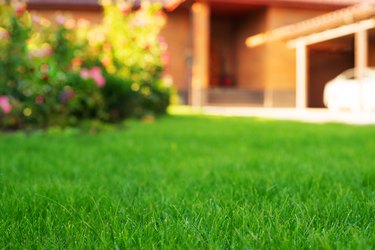
If you live in New Jersey and you're ready to beautify the grass in your yard, you'll need to know the best time to seed a lawn in your area. First, you need to choose the right variety to ensure that your time, effort, and money are well spent. A grass that isn't suited to the environment or climate isn't going to be successful.
Grass Seed Types
Video of the Day
There are two varieties of grass — cool-season and warm-season. Cool-season grass thrives in cooler environments and can handle cold winters, while warm-season grass does well with lots of heat and can tolerate droughts.
Video of the Day
New Jersey's climate is suited for cool-season grass. Grass species that thrive in New Jersey include Kentucky bluegrass, fine fescue, tall fescue, and ryegrass.
When to Seed Grass
The best time to seed grass in New Jersey is in the late summer or early fall. Again, because this is important, opt for a cool-season grass variety because it does well in cooler weather, especially New Jersey's cold winters.
Sowing grass seeds during this time of the year offers good germinating conditions — a combination of mild daytime temperatures, cool nights, and typically sufficient rainfall. Grass seeds have a chance of growing and thriving because there are fewer weeds during this time and, therefore, less competition for the same soil, water, and nutrients.
Aerating and Overseeding
If you have bare patches in your lawn and want to fill them in, you can sow grass seeds in these sections, known as "overseeding." The best time for overseeding in New Jersey is between mid-August through mid-September and sometimes as late as early November.
Aerating is the process of making small holes in the lawn, so the important elements of air, sunlight, and water can access the lawn's roots. There are different methods to aerate turf but one of the most common and effective is taking small sections of plugs and thatch out of the soil with a core aerator. The process is known as core aeration and is a way to add more oxygen into the soil and reduce soil compaction. Core aeration is also a way to sow grass seeds effectively for a healthier and fuller lawn.
If you're wondering when to aerate and overseed in New Jersey, it's best during the late summer and fall months when the temperatures aren't as intense or hot.
It's typically recommended that a lawn is aerated once a year, but this will also depend on a couple of factors, including the type of soil and whether there is a lot of foot traffic on the turf.
Reseeding a Lawn
Sometimes when you sow grass seeds, there will be some areas in your lawn where the seeds didn't germinate at all or they germinated insufficiently. Reseeding is simply planting more seed to thicken your lawn's growth. The best time to reseed in New Jersey is during the spring.
Rake the grass area where you plan to plant more grass seeds; then add lawn fertilizer. Sprinkle grass seeds over the soil manually or use a grass seed spreader and add compost or soil over the seeds. Make sure to water and keep the area moist so the seeds have the best chance at germinating. Reseed when the weather has been dry, so the soil is dry enough that it won't form clumps.
Other times, you'll want to reseed after the summer when the lawn has suffered through either dry weather or heavy traffic. Reseeding in the summer requires more care, including watering frequently to ensure germination and covering the area with a shade cloth so the sprouting seeds don't dry out.